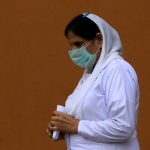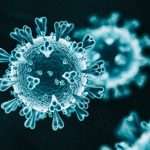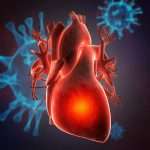The novel Coronavirus disease is a highly contagious viral infection that initiated from Wuhan of China in December 2019 and spread in the whole world due to onward transmission. This highly infectious disease is caused by the Covid 2 (SARS-CoV-2) virus and is responsible for development of serious even lethal respiratory problems. Beside respiratory complications and potential danger of death; COVID-19 flare-up can likewise undermine the emotional well-being of the overall population, causing issues like stress, anxiety, sleep disturbance, restlessness, mental disorders, and even in some cases lead suicide.

The infection itself and deaths of loved ones can be considered as stressful factors which lead to those feelings of anxiety, fear and depression. Ultimately, it results in short-term post traumatic distress. Likewise, the development of the pandemic has overloaded health frameworks i.e. decreasing the accessibility of beds in hospitals and lack of personal protective equipment and ventilators etc. making healthcare providers to experience the extreme mental as well as emotional stress. Similarly, an extreme rise in the number of deaths, fears of infection, along with the absence of sufficient supplies, lack of adequate information and elements of sorrow, sadness, fatigue, finance issues and a prolonged quarantine period has caused psychiatric problems in population.
Considering this stressful condition, there’s an urgent need for developing the strategies that intend to deal with the population’s psychological well-being. Thusly, the usage of psychotropic medications for treating depression during this pandemic is practically inescapable. Because, the utilization of such psychotropic medications as treatment choices for keeping up psychological wellness; is frequently connected with endocrine and metabolic side-effects such as diabetes, weight gain/loss, metabolic disorder and hypertension etc. Consequently, the appropriation of less violent treatments to the human body are significant and should be kept in consideration. In this specific circumstance, the utilization of microorganisms with psychobiotic properties has acquired a great consideration in the scientific community in the past few years.

Psychobiotics are termed as a class of probiotic (good/friendly bacteria) microbes along incredible remedial potential for the cure of mental disorders. Vaghef 2020 reported that numerous microorganisms are psychobiotics such as Streptococcus thermophiles, Bifidobacterium animalis, Bifidobacterium bifidum, Bifidobacterium longum, Streptococcus thermophiles, Lactobacillus bulgaricus, Lactococcus lactis, Lactobacillus acidophilus, Lactobacillus plantarum, Lactobacillus reuteri, Lactobacillus paracasei, Lactobacillus helveticus, Lactobacillus rhamnosus, Bacillus
coagulans, Clostridium butyricum. Intake of satisfactory amountof such microorganisms can aid the creation of neuroactive substances such as gamma-aminobutyric acid (called as GABA; causes relaxation, reduce stress, a more calm, balance mood, alleviation of pain and a boost to sleep), nor-epinephrine (found to be effective in treating mood disorders like depression & anxiety), dopamine (it results feeling happy), serotonin (serotonin is the key hormone that
stabilizes our mood and happiness). Several other studies have also suggested that the administration of psychobiotics can be effective in treating depression, stress, and anxiety.
Allen 2016 reported a clinical study done on 22 physically fit volunteers involving consuming strains of Bifidobacterium longum for about a month. They found that it played a significant role in relieving the chronic stress. Similarly, Nishida 2019 reported that the utilization of tablets containing Lactobacillus gasseri for a prolonged period improved mental as well as sleep disorders in individuals who were presented to constant anxiety.
The principal benefits of utilizing psychobiotic microbes include cure of mental disorders and insights in patients with Parkinson’s/Alzheimer’s illnesses, enhanced metabolism, reduced swelling as well as prompting the body’s natural defense system and most importantly it can help keep mental health of the population intact during the emergencies like SARS-CoV-2.
These psychobiotic microbes can be a revolutionary solution for keeping up emotional, psychological and social well-being in a population which is in fear and anxiety. Supplementation of strains with psychobiotic properties will carry advantages to the host for sure. Yet, future clinical methodologies are required to discover their adequacy in improving the psychological problems arising due to COVID-19 flare-up.
References:
- Vaghef-Mehrabany E., Maleki V., Behrooz M., Ranjbar F., Ebrahimi-Mameghani M. Can psychobiotics “mood” ify gut? An update systematic review of randomized controlled trials in healthy and clinical subjects, on anti-depressant effects of probiotics, prebiotics, and synbiotics. Clinical Nutrition. 2020;39(5):1395–1410. doi: 10.1016/j.clnu.2019.06.004. [PubMed] [CrossRef] [Google Scholar]
- Allen A.P., Hutch W., Borre Y.E., Kennedy P.J., Temko A., Boylan G., Murphy E., Cryan J.F., Dinan T.G., Clarke G. Bifidobacterium longum 1714 as a translational psychobiotic: Modulation of stress, electrophysiology and neurocognition in healthy volunteers. Translational Psychiatry. 2016;6(11) doi: 10.1038/tp.2016.191. e939–e939. [PMC free article] [PubMed] [CrossRef] [Google Scholar]
- Nishida K., Sawada D., Kuwano Y., Tanaka H., Rokutan K. Health benefits of Lactobacillus gasseri CP2305 tablets in young adults exposed to chronic stress: A randomized, double-blind, placebo-controlled study. Nutrients. 2019;11(8):1859. doi: 10.3390/nu11081859. [PMC free article] [PubMed] [CrossRef] [Google Scholar]
![]()

I’m a social activist & a researcher; aiming at constant up-gradation, both professionally as well as personally, in my career with emphasis on success through my hard work. I want to work in a challenging environment and derive professional satisfaction there from.




